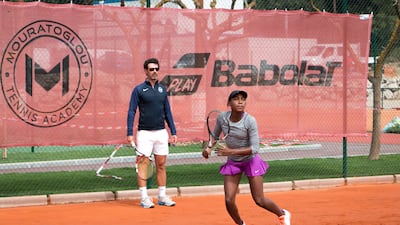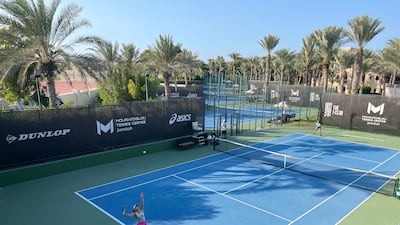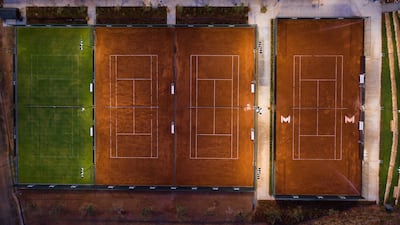Patrick Mouratoglou was once introduced to a boy aged 10 who had, he was told, a precocious talent for tennis. Mouratoglou – considered the Novak Djokovic of coaching – chatted with him about his hopes and aspirations. And then he signed him up.
“They were surprised that I didn’t want to actually see him play, but I didn’t need to,” the French coach tells The National. “Of course, players need technical, physical and strategic skills, but tennis is really about psychology – who the player is, how he is, how he thinks.
“Champions don’t process like other people, not even like other athletes; the world number one thinks differently even compared to the world number 20.”
Coaching Serena Williams and others
That’s where Mouratoglou steps in. He has, after all, fine-tuned the mindset of Stefanos Tsitsipas, the recent French Open finalist; rising star Coco Gauff; and, most notably, Serena Williams, with whom he’s been working for the past decade. Such longevity is largely unheard of in professional tennis.
“It’s the same with football managers. You lose and you’re out. Most coaches last about a year with a top player,” says Mouratoglou. “But if Serena keeps choosing me, hopefully other players see that as a good sign.”
tennis coach
And yet, Mouratoglou is something of a tennis world maverick. He first broke the mould by opening his tennis academy when he was still in his twenties, at a time when many coaches were retired players, something that doesn’t often yield the best results, he says.
“The danger is that they tend to coach how they were coached, fitting the player into their programme rather than tailoring a training programme for each player.”
The coach’s tennis academy near Nice in France soon became notorious for rebooting a player’s game. Now he’s taking the Mouratoglou method international: in December, he opened a second tennis centre at Dubai’s Jumeirah Beach Hotel – which stars such as Bianca Andreescu, Fiona Ferro and Anastasia Pavlyuchenkova have already made their base camp – and recently another at Costa Navarino in Greece, which includes that country’s first grass court. There are more centres in the pipeline.

Making tennis fun with the Ultimate Tennis Showdown
“People have long spoken about taking a ‘golf holiday’, but more and more are now talking about taking a ‘tennis holiday’. If you can be away some place nice, but make real progress with your game, too, that’s an attractive package,” he says.
Mouratoglou also wants tennis to reach more people than can afford luxurious surroundings. The whole culture of tennis risks dying out, he argues, unless it can be made more exciting to younger people, given that its core audience is already in their sixties or older.
It’s why he’s launched the Ultimate Tennis Showdown, a new, faster version of the sport played over four 10-minute quarters, with various wild cards – such as having only one serve and having to win the point in three shots – adding to the excitement. Viewers also get to hear player and coach talk tactics between quarters.
The traditional tennis world has, perhaps predictably, been a touch sniffy about the format, but UTC already draws five top players and audiences of 600,000 on social media.
Mouratoglou says it’s not intended to replace the standard game, but “to offer a more immersive, dynamic, contemporary take that helps people enjoy tennis”. It’s also, he reckons, a necessary response to the faster, more bite-sized world of digital entertainment.
“At least with football, you know it’s normally over in 90 minutes, but you never know when a tennis match might end. And it can be very long and slow, with a lot of the time spent watching the players just going through their routines,” Mouratoglou says with a laugh.
“Professional players get it; that’s why they prefer to watch the highlights instead, too. The fact is that we have so many other options as to what we might do with that time now. And we have to remember that professional sport exists for one reason, because people watch it. Any sport needs to think about its fans, because [sports] people make a good and sometimes incredible living because of them.”
Doing away with the niceties

Giving further fuel to his detractors, Mouratoglou has also been outspoken about the sport’s rather headmasterly code of conduct, and the pantomime of the boring post-match interview, both of which insist on certain niceties rather than the often vitriolic but arresting personalities that defined tennis during its boom decades in the 1970s and 1980s.
Remarkably, he has even taken a pop at how the money in tennis tends to rise disproportionately to the top.
“It can’t be right that you can be, say, the 120th best player in the world and still not be able to make a living, while you might be the 120th best football player just in your country and make 10 times more,” he says.
So does he think of himself as a tennis coaching maverick?
“I don’t try to do things differently,” Mouratoglou insists. “I just try to do what I think needs to be done for tennis. Lots of people have said what I’ve planned to do would be impossible or wouldn’t take off. But it has. Just because something hasn’t been tried a different way before doesn’t mean it won’t work.
“I love tennis. I want it to exist forever. I just want it to modernise. I want more people to be interested.”




